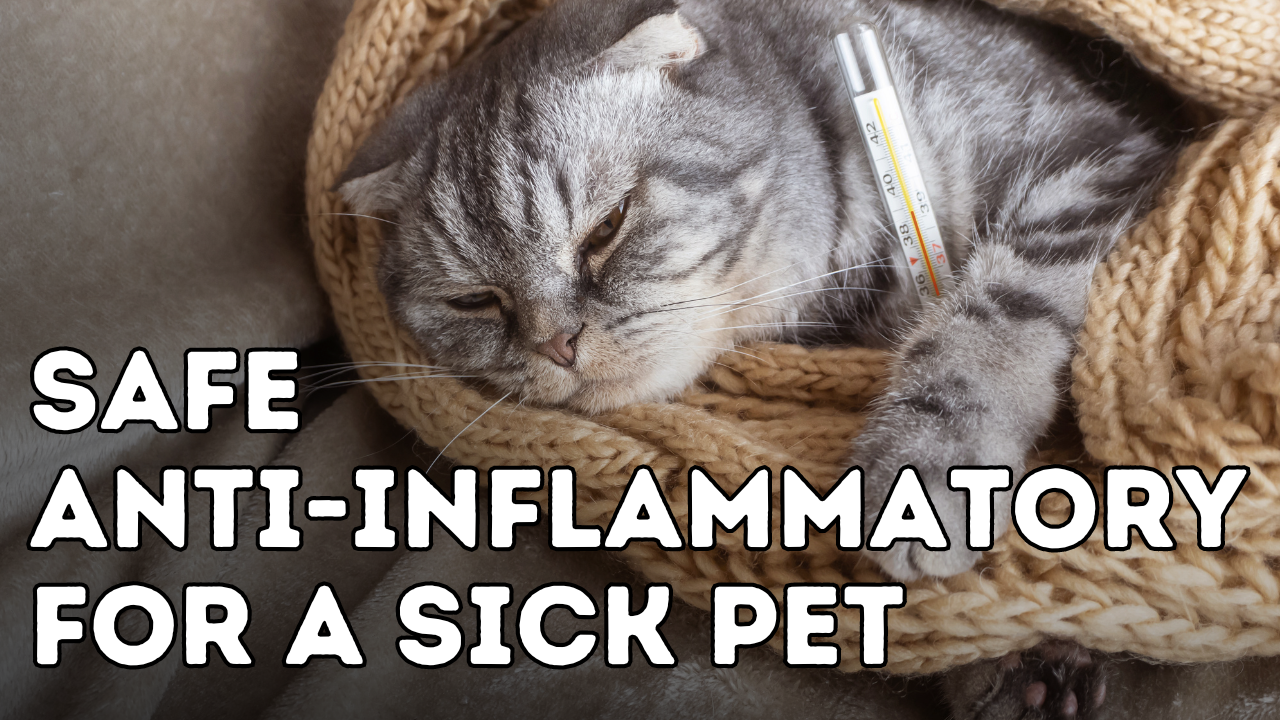Sick pet OR vet with a fever? Use this safe anti-inflammatory

Being sick is NOT fun, and I recently had a bunch of symptoms:
Night sweats…no energy… sore joints and sore throat with a FEVER – I was actually sick for a week 🙁
When your dog or cat has a fever, they are experiencing much the same thing we do.
Unfortunately there are very few safe options that we can give our pets to help lower a fever, except CBD (Cannabidiol)
And earlier animal research has hinted that fever triggered by a virus could be treated using CBD..
Dr. Jones’ Ultimate CBD for Dogs and Cats is a Full Spectrum CBD supplement in 100% Organic Cold Pressed Hemp Oil.
You can get 15% OFF your order of CBD – it’s not only great for fever, but also wonderful for pain!
Shop Holistic Wellness with Cannabinoids Dr Jones’ ULTIMATE CBD for Dogs, Cats
Dr. Jones’ Ultimate CBD for Dogs and Cats


Fever in Dogs and Cats: Recognizing, Understanding, and Treating
Signs and Symptoms
When your dog or cat has a fever, the primary indicator is an elevated body temperature. You might notice a decrease in their appetite and energy levels. Their ears can feel hot to the touch, and they may pant excessively, even indoors. Other symptoms include shivering and an elevated heart rate—much like the symptoms we experience with a fever.
Causes of Fever
Fevers in pets are typically caused by bacterial or viral infections. A higher temperature makes it harder for these pathogens to thrive in the body. However, one of the primary concerns with fever in pets is dehydration, as they often stop drinking. For reference, a normal dog’s temperature is 101°F (38°C), and a normal cat’s temperature is 102°F (38.5°C). To check if your pet has a fever, use a thermometer rectally; if the temperature is 103.5°F (39.5°C) or higher, your pet has a fever.
Fevers are usually a response to something happening in your pet’s body. In my experience, bite wounds are the most common cause. Be sure to thoroughly check your dog or cat for any puncture wounds.
Solutions for Fever
1. Check the Temperature
Start by taking your pet’s temperature to confirm if it’s elevated. If the temperature is 103.5°F (39.5°C) or more, they have a fever. If the fever persists for more than 24 hours and your pet isn’t drinking, contact your veterinarian. However, if your pet is still drinking or while waiting to see the vet, you can try the following remedies and supportive care.
2. Keep Them Hydrated
Ensure there is plenty of fresh water available in different spots around your home. If your pet refuses to drink, use an eyedropper or turkey baster to gently squirt water into the side of their mouth. When a pet is dehydrated, they lose essential minerals, so consider adding Pedialyte, an electrolyte solution, to their water. Some pets might prefer chicken or beef broth or even tuna juice—give them whatever works.
3. Call Your Veterinarian
If a fever persists for more than 24 hours and your pet is not drinking, it’s time to call your vet.
4. Apply a Cool Compress
If your pet tolerates it, apply a cool cloth to their belly. The exposed skin will help cool them down quickly, making them feel a bit better.
5. Consider the Medicine Cabinet
For dogs, aspirin can be used to reduce fever—but NEVER use aspirin in cats. The appropriate aspirin dose for dogs is one 325 mg tablet per 40 pounds of body weight every 12 hours.
Dr. Jones’ All-Natural Pet Supplements

Herbal Remedies
Echinacea, Myrrh, and Sage: These herbs are excellent antimicrobials. You can give a combined herbal formula at a dose of one drop per pound of body weight, twice daily, using a tincture. Alternatively, you can use commercially prepared products like Echinamide, dosing 0.1 ml per 10 pounds every eight hours.
Elderberry and Honey: This combination can be very effective for both viral and bacterial infections, as honey has great antibacterial properties. I recommend using concentrated elderberry powder mixed with ½ teaspoon of honey per 20 pounds, twice a day.
Olive Leaf Extract: This is a potent antibacterial and antiviral treatment. It’s effective against a wide range of infections, including skin and bladder infections, and even kennel cough. Start with a dose range of 1 mg to 5 mg per pound of body weight, twice daily. Begin at the lower end and increase as needed, provided there are no adverse reactions like vomiting or diarrhea.
Antiviral and Cough Remedy Recipe:
- Elderberry concentrate (2000 mg)
- Licorice Root tincture (2 ml)
- Olive Leaf extract (500 mg)
- 1 tablespoon of honey
Homeopathic Remedies
Ferrum Phos: For a pet with a fever but no other serious symptoms, give 30C every four hours for two to three days.
Hepar Sulph (Hepar Sulphuris Calcareum): Administer one 30C tablet every six hours for three days.
Arnica: Useful for addressing the aches and pains associated with fever. Give one 30C tablet per 40 pounds of body weight every four to six hours.
Cannabidiol (CBD): Research suggests CBD may help treat fevers caused by pathogens. Use a CBD dose of 3 mg per 10 pounds once or twice daily.
Shop Holistic Wellness with Cannabinoids Dr Jones’ ULTIMATE CBD for Dogs, Cats
Dr. Jones’ Ultimate CBD for Dogs and Cats

I hope these tips help you manage your pet’s fever at home. Remember, it’s always a good idea to have some remedies on hand, especially CBD, as it has few to no side effects and is one of the safest options for treating fever in cats.
P.S.: I’m feeling better now, thanks to CBD! It turns out I had COVID—definitely not something I recommend.
P.P.S.: If you’re looking for a safe and effective over-the-counter treatment for fever in cats, CBD is the best option. Cats should never be given aspirin, and I’d advise against using any veterinary anti-inflammatory (like Metacam) without caution. You can get a 15% discount on Dr. Jones’ ULTIMATE CBD for Dogs and Cats

Help Needed for My Cat’s Ongoing Skin Issues
Dear Dr. Andrew Jones,
I am reaching out to seek your expertise and guidance for my white, blue-eyed cat, who has been suffering from persistent skin issues for the past six months. I live in Germany and have seen your videos.
Initially, she developed black acne-like spots under her chin, which eventually turned into deep open wounds. After visiting several vets, we were prescribed a foam treatment, but unfortunately, the condition worsened. These black spots have since spread to areas behind her ears, head, and neck, resulting in more wounds from her constant scratching. Despite using a protective collar, she continues to reopen the wounds as soon as she has the chance to scratch them.
Over the last few months, the vets have administered cortisone injections and antibiotics, but there has been no improvement in her condition. We’ve done our best to follow all the recommended treatments, but her health remains unchanged, and it’s becoming increasingly distressing for her and her wounds go seriously deep.
Given your experience, I’m hoping you might have some insight or alternative approaches that could help us heal her. I’m truly dedicated to getting her the best care possible, and I’d greatly appreciate any advice you can offer.
Thank you for your time and consideration. I look forward to hearing from you.
Best regards,
Lydia
This article might help:
Acne is a skin condition that not only occurs in un-wanting teens, but also our dogs and cats. Acne is an infection and inflammation of the hair follicles; the result are small red bumps and pustules at the base of the hair. This condition occurs often in cats with their entire chin read and swollen. In dogs this is also seen with pustules and bumps at the base of the chin.
The causes of acne in animals are similar to that in people. It is often seen in young animals who are maturing and first producing the sex hormones. It can be seen from animals that drool excessively and fail to properly groom themselves; the saliva and dirt are great environments for bacteria to multiply. In cats especially it can be caused by a primary underlying allergy; the inflammation then allows bacteria on the outside of the skin to enter the hair follicle and become infected.
There are a number of effective home remedies.
CLEAN IT DAILY. Wash the chin with an antibacterial soap and a warm cloth. It will open the blocked pores, clear surface debris and allow the pimples to heal more quickly. Use a warm, but not too hot cloth. Rinse thoroughly with warm water.
WARM COMPRESSES. A warm-water compress will open blocked pores and increase blood flow helping the body remove the infection. Soak a cloth in warm water and hold it onto the area until it turns cool. Repeat daily until the acne clears up.
THE PLASTIC CONNECTION. Some pets react to plastic, causing acne to break out. This is very common in cats, and as such you should always give your cats a non plastic food and water bowl. Glass or ceramic dishes, cleaned daily, are the best idea.
CALENDULA. Will soothe the skin and help stop infection. Soak a cotton ball or gauze pad with the tincture and apply to the sore until it cools. It can be used in conjunction with a warm water compress.
ALOE. Also helpful; apply a thin layer of gel from an Aloe Vera plant to soothe the skin.
HERBAL TEA RINSE. Daily skin rinse of cooled chamomile, plantain, or calendula tea may bring relief. Wipe the affected area with the tea, and allow it to drip dry.
Acne in dogs and cats responds well to many of the above suggested home remedies. In serious cases it may require specific veterinary medication, but most can be treated naturally. I encourage you to consider removing plastic bowls, applying topical Aloe and Calendula, and cleaning with an antibacterial scrub.
What to do for a recurring tick fever? My dog eats, but not active and has a temp of 103.9. He has been prescribed antibiotics.
Since he eats but is lethargic and on antibiotics, continue with:
Hydration & monitoring: Encourage drinking—use electrolyte water or broth, and keep multiple bowls available
Cooling comfort: Gently cool ears and paw pads with a damp towel; use fans as needed—but avoid aggressive cooling
Let antibiotics work: Most dogs improve within 24–48?hours; if fever persists beyond 48?hours or worsens, revisit the vet